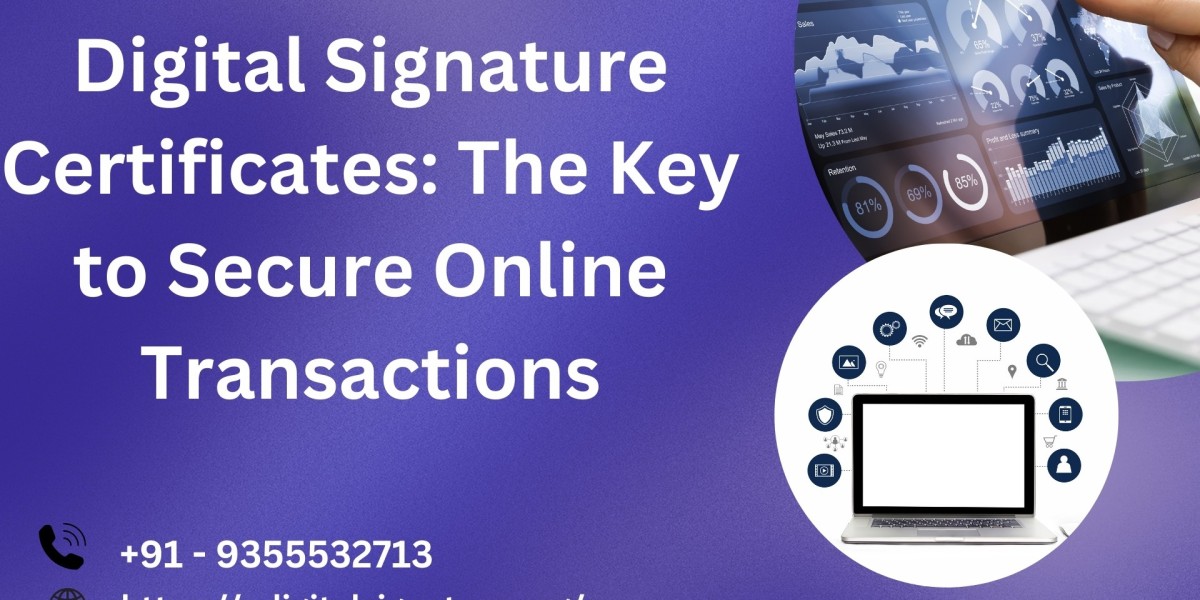Digital Signature Certificate (DSC) have emerged as a critical solution to these challenges, offering a secure, reliable way to protect online interactions. This article delves into the significance of DSCs in safeguarding online transactions and highlights their growing relevance in the digital era.
What Are Digital Signature Certificates?
A Digital Signature Certificate is an electronic credential issued by a trusted Certifying Authority (CA). It serves as a digital equivalent of identity proof, similar to a passport or driver’s license, but tailored for the online world. DSCs contain essential information such as the user’s name, public key, expiration date, and details about the issuing CA. They leverage cryptographic methods to authenticate electronic documents and ensure data security.
DSCs are integral to creating digital signatures—unique, legally binding identifiers created using a combination of public and private cryptographic keys. This robust encryption ensures that the integrity of the document or transaction remains intact and accessible only to authorized users.
Key Attributes of Digital Signature Certificates
- Authentication
DSCs verify the identity of the sender, ensuring that online transactions are genuine and eliminating the risk of impersonation. - Data Integrity
Using cryptographic hashing, DSCs protect information from unauthorized modifications. Any tampering during transmission can be detected, ensuring the data’s originality. - Non-Repudiation
A digital signature backed by a DSC cannot be denied by its creator, making it particularly useful in legal and financial contexts. - Encryption
DSCs encode sensitive information, making it inaccessible to unauthorized users and safeguarding it from interception during transmission. - Global Legitimacy
Many countries recognize digital signatures associated with DSCs as legally enforceable, making them crucial for international operations.
Securing Online Transactions with DSCs
- Reinforcing Identity Verification
Robust identity verification is essential for online transactions, particularly in finance. DSCs authenticate users, ensuring only authorized parties can initiate or approve transactions. - Preventing Unauthorized Access
Cybercriminals often target sensitive information in online transactions. DSCs encrypt this data, rendering it useless without the corresponding decryption key, thereby preventing unauthorized use. - Ensuring Legal Compliance
In jurisdictions where digital signatures are legally mandated for tax filings, contracts, and regulatory submissions, DSCs guarantee compliance while securing transactions. - Streamlining E-Governance
Governments worldwide use DSCs to secure digital platforms for tax filings, procurement processes, and citizen services, ensuring efficiency and transparency. - Boosting E-Commerce Confidence
For e-commerce platforms and digital payment systems, DSCs ensure secure and seamless transactions, building trust among users. - Protecting Corporate Communications
DSCs safeguard sensitive corporate documents such as contracts, financial records, and confidential communications, ensuring access is restricted to authorized personnel.
Process to apply for Digital Signature Certificate
- Access the DSC Portal:
Visit the official website for Digital Signature Certificates at https://edigitalsignature.org/. - Fill Out the Required Details:
Provide the necessary information, including:
- User Type, Class, and Certificate Type: Select your user category (e.g., individual or organization), DSC class (e.g., Class 3), and certificate type (signing only or both signing and encryption).
- Validity Period: Choose how long you want the certificate to remain valid.
- Personal Information: Enter your full name, contact details (phone number, email), and complete residential address.
- Agreement: Accept the terms and conditions before submitting the form.
- Select a Token Option:
Indicate whether you’ll use an existing USB token or need a new one:
- Existing Token: If you already have a token, your DSC can be downloaded onto it.
- New Token: If you don’t have one, select this option to receive a new token with your certificate.
- Payment Process:
Pay the DSC application fee online through net banking, credit/debit card, or UPI. - DSC Issuance:
Once your application and payment are verified, the DSC will be issued. You will receive it preloaded in an encrypted USB token and sent to your address via courier.
Real-World Use Cases for DSCs in Online Transactions
- Tax Filings
DSCs streamline the filing of tax returns and regulatory documents by ensuring authenticity and compliance. - Banking and Financial Operations
Banks use DSCs to secure fund transfers, approve loans, and authenticate users, making financial operations safer. - E-Procurement
Governments and businesses rely on DSCs to authenticate bids in e-procurement systems, ensuring fairness and transparency. - Legal Documentation
DSCs enable the secure signing of contracts and agreements, which hold legal validity in most jurisdictions. - Healthcare and Insurance
DSCs secure sensitive patient data, ensuring compliance with privacy regulations and facilitating safe claim processing. - Intellectual Property Filings
Patents, trademarks, and copyrights are secured through DSCs, preventing tampering or unauthorized access.
Benefits of Digital Signature Certificates
- Superior Security
DSCs utilize Public Key Infrastructure (PKI), one of the most secure encryption technologies available, to protect online transactions. - Cost Efficiency
By reducing the need for paper-based processes and in-person verifications, DSCs save both time and resources. - Environmental Impact
Paperless transactions facilitated by DSCs contribute to sustainability by reducing paper usage and waste. - Legal Enforceability
DSC-backed digital signatures are legally recognized in courts, making them a trusted tool in legal disputes. - Enhanced Productivity
By automating encryption and authentication, DSCs streamline workflows, leading to faster transaction processing.
The Future of Digital Signature Certificates
The importance of DSCs is set to grow as digital transformation continues to reshape industries. Emerging technologies like blockchain and quantum computing promise to enhance the capabilities of DSCs, making them even more secure and versatile. Moreover, as regulatory frameworks tighten globally to address cybersecurity concerns, the adoption of DSCs is expected to surge.
Also read:- Digital Signature Certificate for Income Tax.
Conclusion
Digital Signature Certificates are indispensable in today’s digital-first world. They provide a robust mechanism for securing online transactions and ensuring authenticity, integrity, and legal compliance. Whether for individual users, businesses, or governments, DSCs play a crucial role in fostering trust in the digital ecosystem.
Embracing DSCs is not merely a security measure but a strategic move to ensure seamless, reliable online operations. As the digital landscape evolves, investing in DSCs will remain a cornerstone of secure and efficient online transactions.



